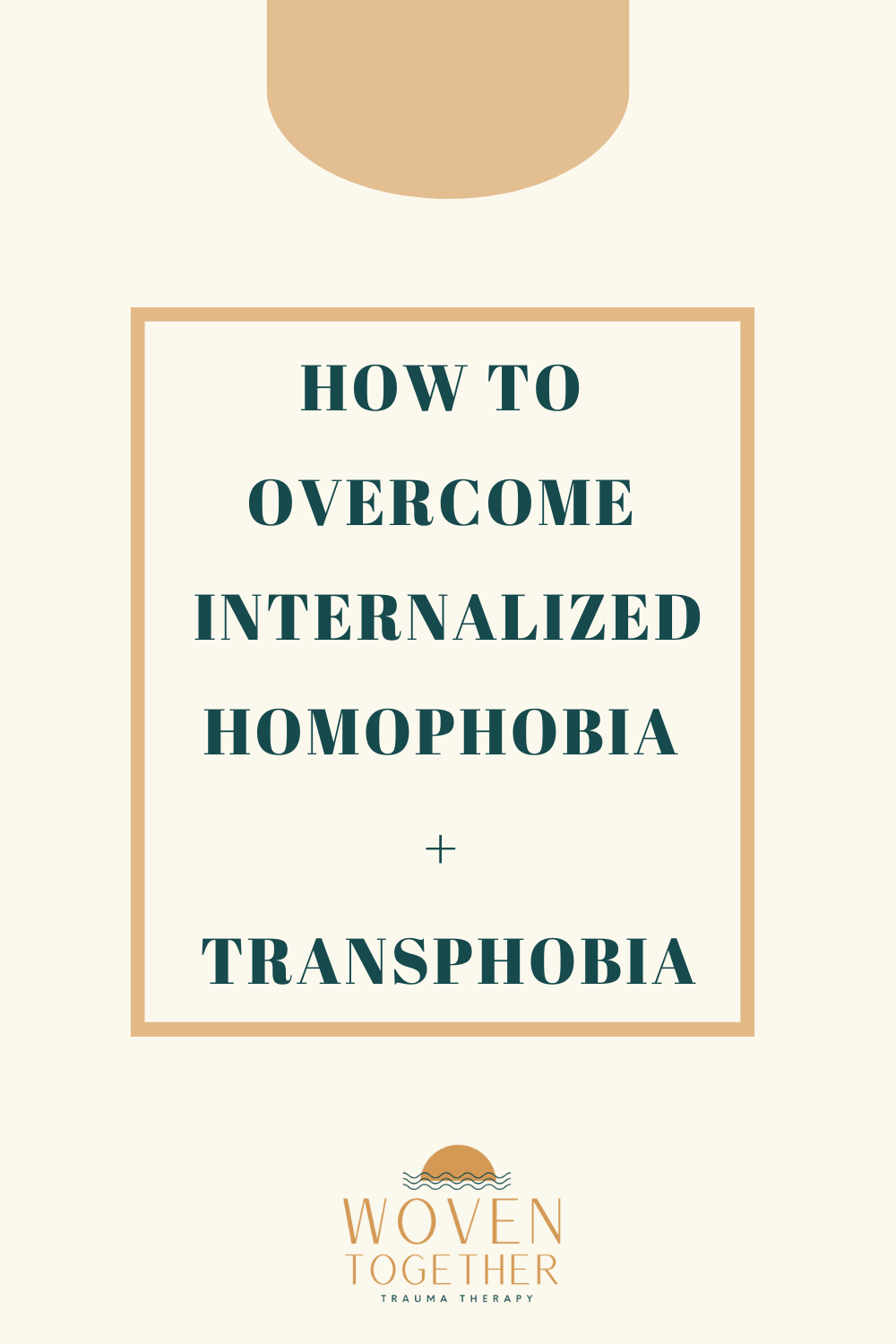How to Overcome Internalized Homophobia and Transphobia
Have you ever felt shame, guilt, or negative feelings about your LGBTQIA+ identity? If so, you may have experienced internalized homophobia and/or transphobia.
If you aren’t familiar with these the terms internalized homophobia and internalized transphobia, let’s start off by defining them before we jump into learning how to overcome them.
Internalized homophobia occurs when a person is subject to society’s negative perceptions, intolerance, and stigma toward people with same-sex attraction. They then turn those ideas inward, believing that they are true, and experience self-hatred as a result of being a socially stigmatized person. - Medical News Today (1)
These attitudes are developed in societies that stigmatize and oppress LGBTQIA+ individuals. Same-sex marriage wasn’t legalized in the United States until 2015, and many protections against employment discrimination for LGBTQIA+ individuals were not put into place until a Supreme Court decision in 2020.
Internalized transphobia refers to the discomfort that a person may experience after internalizing society’s normative gender expectations. Transgender and gender-nonconforming people often experience stigmatization, which may cause them to internalize gender attitudes and develop negative health outcomes. - Medical News Today (2)
Maybe this internalized homophobia/transphobia showed up for you as growing up worrying that you would never be able to marry the person that you love.
Or perhaps you worry that if your employer knew about your LGBTQIA+ identity, your job would be at risk.
Maybe it’s frustration that you can’t access gender-affirming healthcare because of gatekeeping in the mental health and medical fields, and because insurance companies are not required to cover these procedures.
While these are the phrases commonly used to talk about internalized negative attitudes towards LGBTQIA+ identities, we know that these attitudes are not actually phobias. Rather, these are beliefs that being cisgender, heterosexual, and allosexual are the default and the only correct identities. We also know that these attitudes are the result of oppressive systems. For this reason, I will use the term “cissexism” instead of “transphobia,” and “heterosexism” instead of “homophobia.” Using these terms places the responsibility for these attitudes on the oppressive systems that reinforce them, not on the people being oppressed.
You may have internalized cissexism or heterosexism. Some ways internalized cissexism or internalized heterosexism may show up for you:
Unwillingness or inability to identify with LGBTQIA+ identities
Feeling ashamed of LGBTQIA+ identities
Being secretive about partners
Engaging in reckless sexual activity
Making derogatory comments or “jokes” about the LGBTQIA+ community
Worry or anxiety about being perceived as a member of the LGBTQIA+ community (in a way that is not related to safety)
Voting for legislators or legislation that systemically oppress the LGBTQIA+ community
Shaming others for behaviors that they perceive to be outside of cissexist and heterosexist norms
The Impact of Internalized Cissexism and Heterosexism
These internalized attitudes may increase stress, negative mental health outcomes, and hiding identities. These attitudes may also negatively impact relationships, and cause individuals to avoid healthcare providers for fear of discrimination. (3)
So what do you do after identifying these attitudes?
Find support. It might be helpful for you to have mental health support via working with an individual therapist and/or a group so you can process these internalized beliefs.
Find positive portrayals of the LGBTQIA+ community (check out this article for some resources). Look for positive representation of LGBTQIA+ identities in media and in your community.
Speak up when people make derogatory comments or “jokes” about the LGBTQIA+ community.
Look for ways to advocate for the LGBTQIA+ community in your community and in legislation.
If you are a California resident and would like to try therapy with a trauma-informed therapist specializing in LGBTQIA+ trauma, you can set up a free 30-minute consultation with our therapist matchmaker below.
Sources:
Medical News Today: Internalized Homophobia - https://www.medicalnewstoday.com/articles/internalized-homophobia
Medical News Today: Internalized Transphobia - https://www.medicalnewstoday.com/articles/internalized-transphobia
Medical News Today: Internalized Homophobia/Transphobia - https://www.medicalnewstoday.com/articles/internalized-transphobia#how-can-it-affect-health & https://www.medicalnewstoday.com/articles/internalized-homophobia#how-it-may-affect-health





